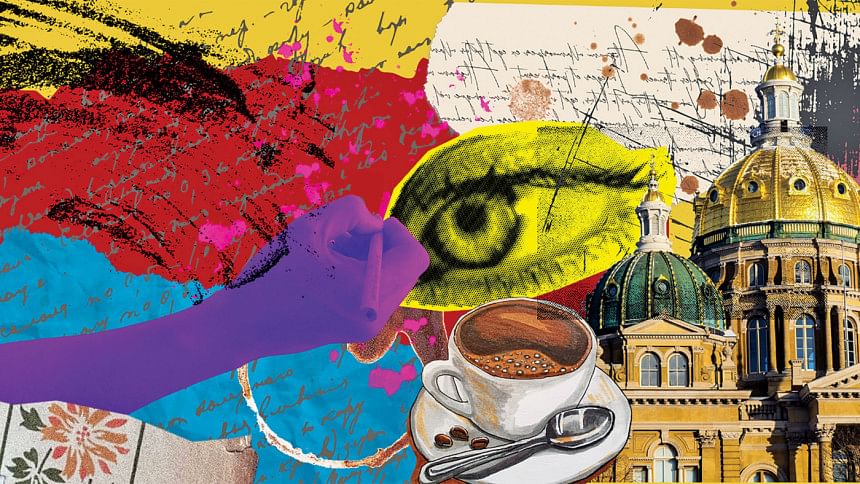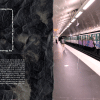The first semester is your shitty first draft

Like many veterans, I joined a creative writing MFA program because I wanted to evolve as a writer. Without planning to, I'd left feature writing behind, and working as an editor and English lecturer was drowning me in words that weren't my own. It was exhilarating, being able to juggle them, parse them open, spin them into arrangements that pressed forth unexpected observations. But I was also blunting my own voice, which I wanted to temper into a sharper, zanier force. Most of all, I wanted the gift of time.
And then I arrived in Iowa City, late summer of 2023, frothing with motivation. Believing that Dhaka's incessant honking, its sludge of traffic, sooty air and the cacophony of its opinions and expectations prevented me from writing freely. Iowa was an expanse of space and time, where the worst traffic jam might just give you a 15 minute commute. Its quiet, clean air beamed hot in August, and I was met with thudding inner silence. Years of working at this newspaper had conditioned me to write and edit with a target audience in mind, and I struggled to muster up constructive feedback for others' writing in workshops; worse, I didn't know what stories I wanted to tell. The oil has to be very hot, my friend told me on the phone one morning as I fried the first sunny side up in my kitchen in Iowa, so hot that the edges will crisp and curl into themselves, the white and orange center puffing up to form its own unique map. That is what our workshop essays sought to be. Sizzle around the edges, their own shape and shine. How did one conjure and help better such writing that is still growing into itself, that doesn't yet heed the noise of an audience or destination?
If five months at an MFA program have taught me anything, it is that each person's experience is vastly different from another's.
MFAs are made up of artists—who are both the students and the teachers in the program—and every artist commutes differently through their creative process. One writer might thrive in settings that offer clear, directional feedback, and another might feel closed in by such shepherding of their art. Some of us feel buoyed by extensive comments on our writing; others feel overwhelmed.
Shadowing all of that are the contexts in which such feedback is provided, which shape our responses to them in complex, often contentious ways. "What we call craft is in fact nothing more or less than a set of expectations", Matthew Salesses rightly argues in Craft in the Real World: Rethinking Fiction Writing and Workshopping (Catapult Books, 2021). "These expectations...represent the values of the culturally dominant population: in America that means (straight, cis, able, upper-middle-class) white males. When craft is taught unreflexively, within a limited understanding of the canon, it reinforces narrow ideas about whose stories are important and what makes a story beautiful, moving, or good."
It was the University of Iowa's workshop model that offered a template for creative writing education across North America, and it is Iowa's model, too, that Salesses dismantles in his much needed critique of diversity in creative writing discourse. Its necessary politics would come up in our very first class at UIowa, but over the course of the semester I'd discover an aspect of it that only personal experience could illustrate.
Cultural misreadings of craft don't always stem from arrogance or ignorance (though they very often do, wherever there is a mainstream and minority). Sometimes they aren't misreadings at all, but finer dissonances of perspective factored by personal taste, communal history, religious and cultural legacies, and even one's place in time. How ironic that, for all my yearning to escape, the first essay I'd produce in Iowa's soothing silence would recall the noises of Bangladesh—the rustle of its mottled and discarded materials, the sizzle of its food, the bleating of horns and voices, the way we smooth over discord and learn to harvest silence in our hearts. I was trying to write about Birangonas, about violences against women in my country, and it felt insensitive to place those injustices against the ones I've faced as an educated, privileged woman in contemporary Bangladesh.
Where I saw shallow comparisons in my own writing, a fellow workshopper descended from the political strife of Ireland saw fertile ground for juxtaposition; she saw a necessary collage of change and stasis in a country. Where I believed Partition's ghosts were essential to my stories, another friend from Sri Lanka, who most instinctively understood my stories, felt that the history came too heavy handed, its events already familiar. "Familiar for whom?" I countered, though I soon agreed that the history would be better retold by myself, not by the borrowed voices of quotations and references.
My author's gaze both shifted and stood its ground through those workshop evenings, and they were two of the most useful conversations I've ever had about my writing. From the gaps and bridges in our perspective emerged urgent questions relating to my work as an artist: Who am I writing for, when I write about my home while living far from it? Where in its complicated history do I place myself?
Questions begat more questions, and we developed our own vocabulary for critique. The things our essays were trying to do, and the places in which they catch fire. How one friend's fluid visuals make me feel like I'm underwater, and another's tender infusion of emotions undercuts the need for "pretty sentences". Possibilities that we saw in each other's writing, and my personal need to venture beyond the braided essay mold.
My mind felt like the insides of a washing machine through much of this first semester. Brief flashes of insight tumbled out of sight before I could grasp at them. When ideas did linger, the writing itself moved with the drags and sudden jolts of Dhaka's nausea-inducing traffic. It is difficult to persist through such turbulent inertia, when you're surrounded by talented writers, poets, playwrights and artists milling around you. When even the Uber drivers you chat with have novels and poetry in progress.
"The first draft is the child's draft", Anne Lamott writes in "Shitty First Drafts", an essay from her craft book, Bird by Bird (1994), "where you let it all pour out and then let it romp all over the place, knowing that no one is going to see it and that you can shape it later." Lamott is talking about her nerve wracking experience of writing food reviews for California magazine—a process relatable to perhaps any person who has tried to write anything worthwhile. There is panic induced by a blank page. The first round(s) of dreadful sentences. Introductions and descriptions bleed beyond the page limit of the assignment. You ramble, you cross out, and after the first draft erupts, you return with sharper eyes. You weed out redundancies, chisel the spaces with potential. Sometimes, and for some more often than others, what emerges compensates for all the preceding anxiety.
I read Lamott's essay in the beginning of the Fall semester and saw myself in more and more of it through all the shitty writing I was producing at the time. But shittiness implies futility, an end-of-the-road-ness that we associate with failed relationships, toxic arguments, or the kind of person or power dynamic that breeds hurt and harm in others. It is a thing at the end of its ability to create value. First anythings—writing and learning projects in particular—are the opposite of that. They're the mounds before the sculpting, the muscle that aches only until the next workout, and there is promise in these feelings of frustration. I could say I had this epiphany while writing this essay (and wouldn't that be great for a climax?), but the truth is, as happens with art, it was brewing in me through all those moments of dissatisfying writing as the Midwestern leaves around us turned from green to gold to cold, white fluff. I was making my oil hot, even as I wrung my hands over a few broken egg shells.
Sarah Anjum Bari is a writer and editor teaching Rhetoric and pursuing an MFA in the Nonfiction Writing Program at the University of Iowa, USA. Reach her at [email protected].

 For all latest news, follow The Daily Star's Google News channel.
For all latest news, follow The Daily Star's Google News channel. 









Comments